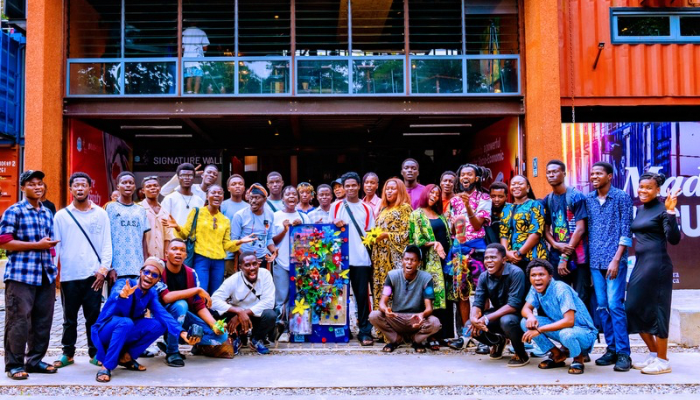
…awards $10,000 seed funding to visionary start-up
Africa is a powerhouse of talent, and its artists and creatives are making waves globally. The continent’s creative sector has gained traction, attracting significant interest and investment. However, Africa’s share of the global creative economy remains modest, accounting for only about 2.9 percent of global creative goods exports according to UN Trade and Development (UNTAD).
Despite this, the digital and creative economy in Africa is rapidly expanding. The International Finance Corporation’s (IFC) projections also indicated a sixfold growth by 2050, reaching $712 billion. In Nigeria alone, the country’s movie, music, and entertainment industries contributed to US$1.4 billion in 2023 to the GDP from US$1.1 billion in 2020.
A shining example of this progress is MAD House, Africa’s premier hub for creativity and innovation. “The MAD House,” short for “Make A Difference House,” stands as a symbol of disruption and innovation.
Its exterior, fashioned from 26 interconnected containers, and its unconventional yet functional interior, create many pathways into the world of creativity.
The firm’s commitment to creating an impactful creative community is evident, as it provides mentorship programs, workshops, and networking events to bridge the gap between academia and industry.
On June 28, 2024, MAD House, concluded its Lens-Based Incubation Programme, awarding $10,000 in seed funding to the winner of its Demo Day pitch competition. The host designed this programme in collaboration with the University of Lagos to equip African creatives with essential business skills to establish profitable ventures.
Tunde Raphael, Founder AfrikoHub emerged winner of the competition.
Speaking to the press at the event, Udoh Christopher Emmanuel, Manager of MAD House, said, “This initiative is timely, addressing the demands of Nigeria’s creative industry, where the visual arts are increasingly recognised for their contributions to cultural identity and societal progress.”
“Today is unique because we have three different events happening simultaneously,” he continued. “One is our monthly community event, the second event focuses on building sustainable creative enterprises, and our inaugural Lens-Based Incubation Programme ends today, with participants pitching their business ideas for a chance to win $10,000.”
The programme brought together 20 participants from Nigeria, Rwanda, Nairobi, South Africa, and Ghana, selected from over a thousand applications.
“Our selection criteria included a strong vision and scalability of the business idea,” the manager said. “We are encouraging participants to create product-based solutions, like photography equipment from recycled materials and fabrics inspired by microorganisms, challenging international companies and showcasing local innovation.”
David Tunmise George, a participant’s project, focused on addressing the critical skills gap within Africa’s creative economy. “The passion for this project came about after realising the importance of Africa’s position in this industrial revolution,” George said. “In previous revolutions, Africans were either slaves or consumers. In this fourth revolution, the digital and creative revolution, Africa needs to decide if it wants to be a producer or remain a consumer. This revolution is our opportunity to take charge.”
George’s project aims to train and provide opportunities for African creatives, helping them bring their ideas to life. “In Africa, we have a huge problem with mediocrity. We have a lot of creatives, but few can get things done due to a lack of training and resources. We want to create well-rounded creatives who can compete globally.”
Boluwatife Fagbenro Christiana, a visual artist and geologist, is another participant working on a groundbreaking project. “I am creating an immersive experience for people who cannot physically visit heritage sites, making them accessible virtually,” she said.
Christiana highlighted the importance of her work: “Nigeria has beautiful cultural landscapes and heritage sites that are not well documented. Asides, human activities and nature itself are degrading these sites over time. We need to preserve and make them accessible.”
Also at the event, Folasade Ogunsola, the Vice-Chancellor of the University of Lagos, shared the university’s approach and investment in molding talents for Africa’s creative economy.
“Our school was established to provide manpower for the nation. As Nigeria’s population has increased, we have a very young population with a high unemployment rate,” she said. “It became clear to us that we needed to develop manpower for people who are going to be employers of labor rather than chase this job market that does not exist.”
Ogunsola also highlighted the importance of harnessing creativity. “Whenever a community starts to rise, it starts with the creatives because they are an expression of self,” she said.
“The musicians, actors, entertainers, etc are making a living and creating employment from their talents. So we felt it was important for us to also develop the talent of our students,” the VC continued. “Bayo Omoboriowo, the founder of Mad House, was one of our alumni, and working with him ensures that the Humanities and the Creatives have a way to turn their talent into business.”










